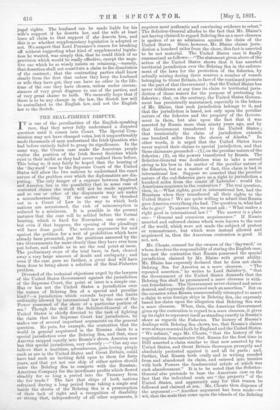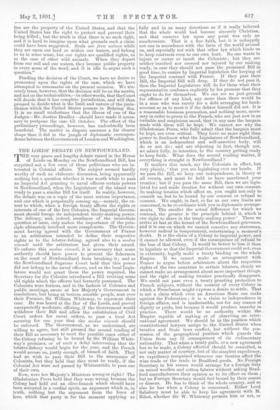THE SEAL-FISHERY DISPUTE.
IT is one of the peculiarities of the English-speaking race, that they never fully understand a disputed question until it comes into Court. The Special Com- mission may not have changed votes, but it unquestionably made thousands of men understand the Irish Question who had before entirely failed to grasp its significance. In the same way, the Cronin case made the American people realise the position of the Irish Secret Societies which exist in their midst as they had never realised them before. This being so, it may fairly be hoped that the hearing of the Sayward ' case by the Supreme Court of the United States will allow the two nations to understand the exact nature of the problem over which the diplomatists are dis- puting. The only danger of a rupture between England and America lies in the possibility that in some case of contested claims the truth will not be made apparent, and so one or other of the disputants may act under a misunderstanding. If the matter can be threshed out in a Court of Law in the way to which both nations are accustomed, the risk of misconception is reduced to a minimum. It is possible in the present instance that the case will be settled before the formal hearing, which is fixed for November, can come on ; but even if that happens, the opening of the pleadings will have done good. The written arguments for and against the petition for a writ of prohibition which have already been presented, put the positions assumed by the two Governments far more clearly than they have ever been put before, and enable us to see the real point at issue. The preliminary steps of the trial have, in fact, cleared away a very large amount of doubt and ambiguity; and even if the case goes no further, .a great deal will have been done to bring about a solution of the Seal-Fisheries problem. Divested of the technical objections urged by the lawyers of the United States Government against the jurisdiction of the Supreme Court, the point at issue is a simple one. Has or has not the United States a jurisdiction over the waters of Behring Sea of a special and peculiar kind ?—a jurisdiction which extends beyond the limits ordinarily allowed by international law in the case of the Power possessed of the shore of a particular portion of sea ? Though the skill of the Solicitor-General of the United States is chiefly directed to the task of fighting the claim that the Supreme Court has jurisdiction, he makes use of several important arguments on the general question. He puts, for example, the contention that the world in general acquiesced in the Russian claim to a special jurisdiction over the Behring Sea, and that, since America stepped exactly into Russia's shoes, America now has this special jurisdiction, very cleverly :—" Can any one believe that a maritime, adventurous, gain-loving people such as are in the United States and Great Britain, could have had such an inviting field open to them for forty years, and that yet not one ship of either nation should enter the Behring Sea to compete with the Russian. American Company for the inordinate profits which flowed steadily for so long a period into the Treasury from the fur trade ? The fact that ships of both nations refrained during a long period from taking a single seal inside the shores of the Behring Sea is a presumption of their lack of right and a recognition of disability so strong that, independently of all other arguments, it requires most authentic and convincing evidence to rebut." The Solicitor-General alludes to the fact that Mr. Blaine's not having claimed to regard Behring Sea as a mare claueum is spoken of as an admission against the claim of the United States. Since, however, Mr. Blaine claims juris- diction a hundred miles from the shore, this fact is asserted to be not material. The United States case is finally summarised as follows :—"The statement given above of the action of the United States shows that it has asserted territorial jurisdiction over the Behring Sea in the enforce- ment of the laws for the protection of the fisheries, by actually seizing during three seasons a number of vessels belonging to Great Britain, in face of the continued protests on the part of that Government ; that the United States has never withdrawn at any time its claim to territorial juris- diction of those waters for the purpose of protecting its fisheries ; that, on the contrary, the United States Govern- ment has persistently maintained, especially in the letters of Mr. Blaine, that such jurisdiction belongs to it, and that the jurisdiction is based, not only upon the peculiar nature of the fisheries and the property of the Govern- ment in them, but also upon the fact that it was asserted by Russia more than ninety years ago, and by that Government transferred to the United States ; that territorially the claim of jurisdiction extends one hundred miles from the shores of Alaska." In other words, it is urged that the United States have never waived their claims to special jurisdiction, and that these claims are grounded—(1), on the peculiar nature of the fisheries ; (2), on the powers transferred by Russia. The Solicitor-General was doubtless wise to take a second string to his bow in the matter of the peculiar nature of the fisheries, but as a matter of fact, this claim is bad in international law. Suppose we asserted that the peculiar nature of the cod-fisheries gave us a right to jurisdiction a hundred miles from the coasts of Labrador : would the Americans acquiesce in the contention ? The real question, then, is,—What rights, good in international law, had the Russians when they transferred all their rights to the United States ? We are quite willing to admit that Russia gave America everything she had. The question is, what had she to give? To answer this, we must ask : "What makes a right good in international law ? " The answer is a plain One: "General and conscious acquiescence." If Russia asserted and enforced claims which were known to the rest of the world, which were not made the subject of protest or remonstrance, but which were instead allowed and acquiesced in, then the American contention is good. If not, not.
Mr. Choate, counsel for the owners of the Sayward,' on whom devolves the responsibility of stating the English case, has met the contention that Russia possessed the special jurisdiction claimed by Mr. Blaine with great ability. Mr. Blaine has expressly declared that he does not claim Behring Sea for America as a mare olausum. "The repeated assertion," he writes to Lord Salisbu7, "that the Government of the United States demands that the Behring Sea shall be pronounced a mare clawrum is with- out foundation. The Government never claimed and never desired, and expressly disavowed such an assertion." But on the occasion when Russia unsuccessfully attempted to assert a claim to seize foreign ships in Behring Sea, she expressly based her claim upon the allegation that Behring Sea was a mare claueum. When, then, the American Government gives up the contention in regard to a mare claueum,, it gives up its right to represent itself as standing exactly in Russia's shoes as regards the Fisheries. The history of Russia's dealings with Behring Sea shows, too, that Russia's claims were always resented both by England and the United States. "We submit," says Mr. Choate, "that the history of the negotiations demonstrates that Russia for the first time in 1821 asserted a claim similar to that now asserted by the United States, and Great Britain thereupon promptly and absolutely protested against it and all its parts ; and, further, that Russia both orally and in writing receded from and abandoned its claim, and entered into treaties with both Powers the fundamental article of which. was such abandonment." It is to be noted that the Solicitor- General also pretends to base the American case on the fact that the individual seals are "the property" of the United States, and apparently may for that reason be followed and claimed at sea. Mr. Choate thus disposes of the argument :—" Another argument has been made—to wit, that the seals that come upon the islands of the Behring Sea are the property of the United States, and that the United States has the right to protect and prevent their being killed ; but the truth is that there is no such right, and it is hard to imagine upon what grounds such a claim could have been suggested. Seals are term nohow while they are upon our land or within our waters, and belong to us in some sense, but our rights are qualified rights, as in the case of other wild animals. When they depart from our soil and our waters, they become public property in every sense of the word, and it is idle to argue such a question."
Pending the decision of the Court, we have no desire to pronounce upon the rights of the case, which we have attempted to summarise on the present occasion. We sin- cerely trust, however, that the decision will be on the merits, and not on the technicalities,—in other words, that the Court will decide that it has complete jurisdiction, and will then proceed to decide what is the limit and nature of the juris- diction which the United States possess in Behring Sea. It is no small misfortune that the illness of one of the Judges—Mr. Justice Bradley—should have made it neces- sary to postpone the case till October. The effect of the preliminary proceedings, however, has undoubtedly been beneficial. The matter in dispute assumes a far clearer shape than it did in the jungle of diplomatic correspon- dence between the Governments of London and Washington.







































 Previous page
Previous page